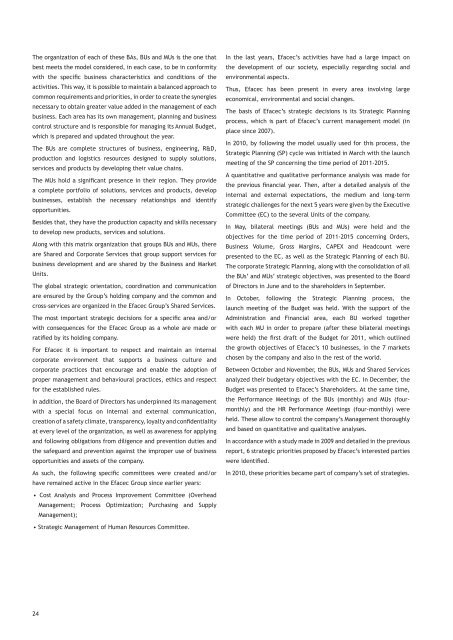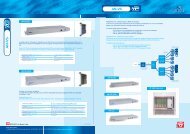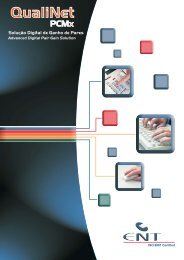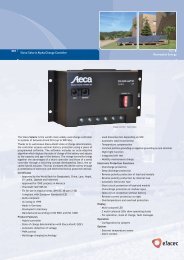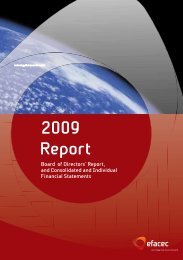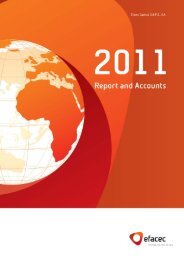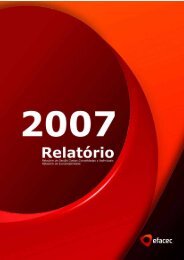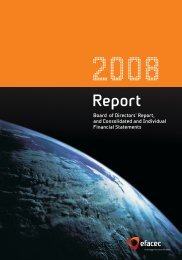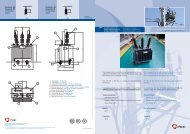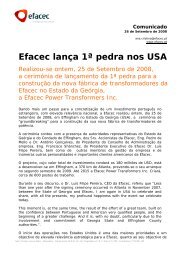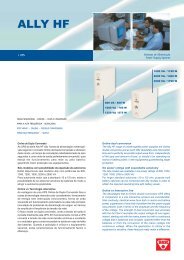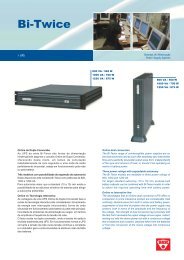Relatorio de gestao_2010_INGLES.indd - Efacec
Relatorio de gestao_2010_INGLES.indd - Efacec
Relatorio de gestao_2010_INGLES.indd - Efacec
You also want an ePaper? Increase the reach of your titles
YUMPU automatically turns print PDFs into web optimized ePapers that Google loves.
The organization of each of these BAs, BUs and MUs is the one that<br />
best meets the mo<strong>de</strong>l consi<strong>de</strong>red, in each case, to be in conformity<br />
with the specifi c business characteristics and conditions of the<br />
activities. This way, it is possible to maintain a balanced approach to<br />
common requirements and priorities, in or<strong>de</strong>r to create the synergies<br />
necessary to obtain greater value ad<strong>de</strong>d in the management of each<br />
business. Each area has its own management, planning and business<br />
control structure and is responsible for managing its Annual Budget,<br />
which is prepared and updated throughout the year.<br />
The BUs are complete structures of business, engineering, R&D,<br />
production and logistics resources <strong>de</strong>signed to supply solutions,<br />
services and products by <strong>de</strong>veloping their value chains.<br />
The MUs hold a signifi cant presence in their region. They provi<strong>de</strong><br />
a complete portfolio of solutions, services and products, <strong>de</strong>velop<br />
businesses, establish the necessary relationships and i<strong>de</strong>ntify<br />
opportunities.<br />
Besi<strong>de</strong>s that, they have the production capacity and skills necessary<br />
to <strong>de</strong>velop new products, services and solutions.<br />
Along with this matrix organization that groups BUs and MUs, there<br />
are Shared and Corporate Services that group support services for<br />
business <strong>de</strong>velopment and are shared by the Business and Market<br />
Units.<br />
The global strategic orientation, coordination and communication<br />
are ensured by the Group’s holding company and the common and<br />
cross-services are organized in the <strong>Efacec</strong> Group’s Shared Services.<br />
The most important strategic <strong>de</strong>cisions for a specifi c area and/or<br />
with consequences for the <strong>Efacec</strong> Group as a whole are ma<strong>de</strong> or<br />
ratifi ed by its holding company.<br />
For <strong>Efacec</strong> it is important to respect and maintain an internal<br />
corporate environment that supports a business culture and<br />
corporate practices that encourage and enable the adoption of<br />
proper management and behavioural practices, ethics and respect<br />
for the established rules.<br />
In addition, the Board of Directors has un<strong>de</strong>rpinned its management<br />
with a special focus on internal and external communication,<br />
creation of a safety climate, transparency, loyalty and confi <strong>de</strong>ntiality<br />
at every level of the organization, as well as awareness for applying<br />
and following obligations from diligence and prevention duties and<br />
the safeguard and prevention against the improper use of business<br />
opportunities and assets of the company.<br />
As such, the following specifi c committees were created and/or<br />
have remained active in the <strong>Efacec</strong> Group since earlier years:<br />
• Cost Analysis and Process Improvement Committee (Overhead<br />
Management; Process Optimization; Purchasing and Supply<br />
Management);<br />
• Strategic Management of Human Resources Committee.<br />
24<br />
In the last years, <strong>Efacec</strong>’s activities have had a large impact on<br />
the <strong>de</strong>velopment of our society, especially regarding social and<br />
environmental aspects.<br />
Thus, <strong>Efacec</strong> has been present in every area involving large<br />
economical, environmental and social changes.<br />
The basis of <strong>Efacec</strong>’s strategic <strong>de</strong>cisions is its Strategic Planning<br />
process, which is part of <strong>Efacec</strong>’s current management mo<strong>de</strong>l (in<br />
place since 2007).<br />
In <strong>2010</strong>, by following the mo<strong>de</strong>l usually used for this process, the<br />
Strategic Planning (SP) cycle was initiated in March with the launch<br />
meeting of the SP concerning the time period of 2011-2015.<br />
A quantitative and qualitative performance analysis was ma<strong>de</strong> for<br />
the previous fi nancial year. Then, after a <strong>de</strong>tailed analysis of the<br />
internal and external expectations, the medium and long-term<br />
strategic challenges for the next 5 years were given by the Executive<br />
Committee (EC) to the several Units of the company.<br />
In May, bilateral meetings (BUs and MUs) were held and the<br />
objectives for the time period of 2011-2015 concerning Or<strong>de</strong>rs,<br />
Business Volume, Gross Margins, CAPEX and Headcount were<br />
presented to the EC, as well as the Strategic Planning of each BU.<br />
The corporate Strategic Planning, along with the consolidation of all<br />
the BUs’ and MUs’ strategic objectives, was presented to the Board<br />
of Directors in June and to the sharehol<strong>de</strong>rs in September.<br />
In October, following the Strategic Planning process, the<br />
launch meeting of the Budget was held. With the support of the<br />
Administration and Financial area, each BU worked together<br />
with each MU in or<strong>de</strong>r to prepare (after these bilateral meetings<br />
were held) the fi rst draft of the Budget for 2011, which outlined<br />
the growth objectives of <strong>Efacec</strong>’s 10 businesses, in the 7 markets<br />
chosen by the company and also in the rest of the world.<br />
Between October and November, the BUs, MUs and Shared Services<br />
analyzed their budgetary objectives with the EC. In December, the<br />
Budget was presented to <strong>Efacec</strong>’s Sharehol<strong>de</strong>rs. At the same time,<br />
the Performance Meetings of the BUs (monthly) and MUs (fourmonthly)<br />
and the HR Performance Meetings (four-monthly) were<br />
held. These allow to control the company’s Management thoroughly<br />
and based on quantitative and qualitative analyses.<br />
In accordance with a study ma<strong>de</strong> in 2009 and <strong>de</strong>tailed in the previous<br />
report, 6 strategic priorities proposed by <strong>Efacec</strong>’s interested parties<br />
were i<strong>de</strong>ntifi ed.<br />
In <strong>2010</strong>, these priorities became part of company’s set of strategies.


